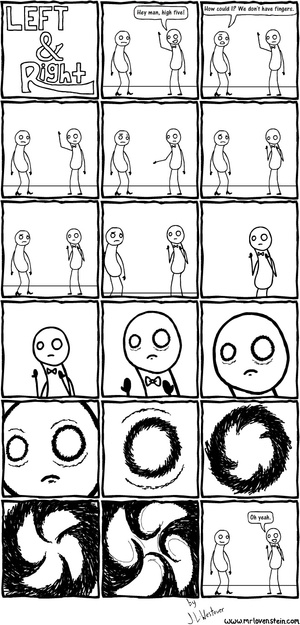Who you gonna call?
Last night on Tonight with Vincent Browne, the host disclosed to his panel – co-authors of Fingers (Gill & MacMillan),Tom Lyons and Richard Curran and Elaine Byrne, of the Sunday Independent – that he had got a loan from the Irish Nationwide.
And he wasn’t alone.
Vincent Browne: “One of the interesting things about the Fingleton saga, I think Elaine, I’m not sure if you’re familiar with this is the degree to which he co-opted journalists into his practices and his orbit. And it meant that, not only was there no accountability exercised on Irish Nationwide, or little accountability regarding Michael Fingleton through the regulator and other supervisory bodies but the media played dead, again, on this.”
Browne: “I should own up. I got a mortgage from Irish Nationwide Building Society.”
Byrne: “See?”
Browne: “But anyway, go on, yeah. And I didn’t know what interest rate it was, like many other journalists.”
Byrne: “Did you pay it all off?”
Browne: “Oh, eventually yeah. But by getting a mortgage from somewhere else. I fell out with the building society because I launched a magazine on the basis of not paying the mortgage for a number of months.”
Byrne: “OK. But did it..did it colour your views of Michael Fingleton?”
Browne: “Em. I can’t remember to be quite frank. It coloured my views of the person I was dealing with in Irish Nationwide”
Bryne: “You’re a little bit older than me but..
Browne: “What?”
Byrne: “A small bit. But..so I’m not in the position of having met with Michael Fingleton or mortgage, so it’s more your generation, being very polite but, I mean, was it something that you thought was very prevalent in your time? That people of your generation, journalists, getting mortgages that perhaps, they were a little less difficult to make scrutiny of him or analyse his activities.”
Browne: “Since I myself never engaged at all hardly, virtually in examining financial issues, it didn’t impinge on what I was doing. But I was struck by the fact that, in one newspaper, a Sunday newspaper, during the 70s and early 80s, Michael Fingleton’s picture appeared every Sunday, which I thought was odd at the time.”
Byrne: “On social occasions?”
Browne: “Usually giving a prize to somebody for something or other.”
Byrne: “Well one of the things, one of the journalists said to me this evening actually, an old hack was saying that he was a great guy for going for quotes and that’s how a lot of journalists got to know because often, within the banking, financial world it was a very closed shop, a closed society and that he was actually very publicity aware and that’s how a lot of journalists got to know him. So I guess maybe he was the Fr Brian D’Arcy of the financial world.”
Richard Curran: “I think one of the things Vincent aswell about the journalists and the mortgages with Irish Nationwide, it seems to have been, with all due respect, among a certain generation. I kind of started in business journalism in 1992/93 and I never would have thought of or dreamt of particularly going to Irish Nationwide if I wanted to get a mortgage or anything else. But I kind of discovered that quite a lot of people, who were older than me and might have got their first mortgage in the 70s, or in the 80s even, had gone to Irish Nationwide. And if you get into the issue then or whether or not the media performed its role adequately in relation to Irish Nationwide, over a long period of time. Journalists are consumers, the same as everyone else. So the question is so if I have a mobile phone, and I’m a customer of one mobile phone company, does that compromise me? No. The question is whether I feel I owe them something, whether I feel beholden to them for something in some way. So I think in Irish Nationwide’s case, because of the way mortgages were given out at the time, because of the way journalists earn their income, a lot of journalists felt that they wouldn’t get a mortgage anywhere else.”
Browne: “Yes, that was certainly the case.”
Curran: “So they felt they owed him.”
Byrne: ” A loyalty, deference.”
Curran: “Yeah, so the question is whether that would have coloured how they wrote about the society or how they wrote about him.”
Browne: “Building societies coloured journalists as a bad risk, not just because they didn’t have secure jobs, many of us did have secure jobs at the time, but we weren’t good at managing the finances we did have, or whatever those finances were. And therefore the word would spread around that it was possible to get a mortgage from Irish Nationwide whereas it was not possible to get it elsewhere. And I’m sure that was a compromising factor.”
Curran: “And you also have to remember then that during those years Irish Nationwide was incredible profitable. So if you were a business journalist, writing about it, what were you going to say? ‘He’s making loads of money for the members, everything seems to be going fantastically’. He was paying himself a lot of money, that was known. But then, in around, you know, the early 2000s is when we saw some journalistic campaigning, particularly done by Bill Tyson, as personal finance editor of the Sunday Independent, where he challenged Irish Nationwide and the way he treated small borrowers and he went on to win two national media awards on foot of his Irish Nationwide coverage so clearly any sense that people might have had that Irish Nationwide was not being heavily criticised, or not being acknowledged if it did anything wrong, that it clearly was gone because many of the judges would have been peers of journalists at the time and they would have felt this is really, really good word that you’re doing. So I think that there’s a generational element to that.”
Watch here
Previously: Brought To Book














